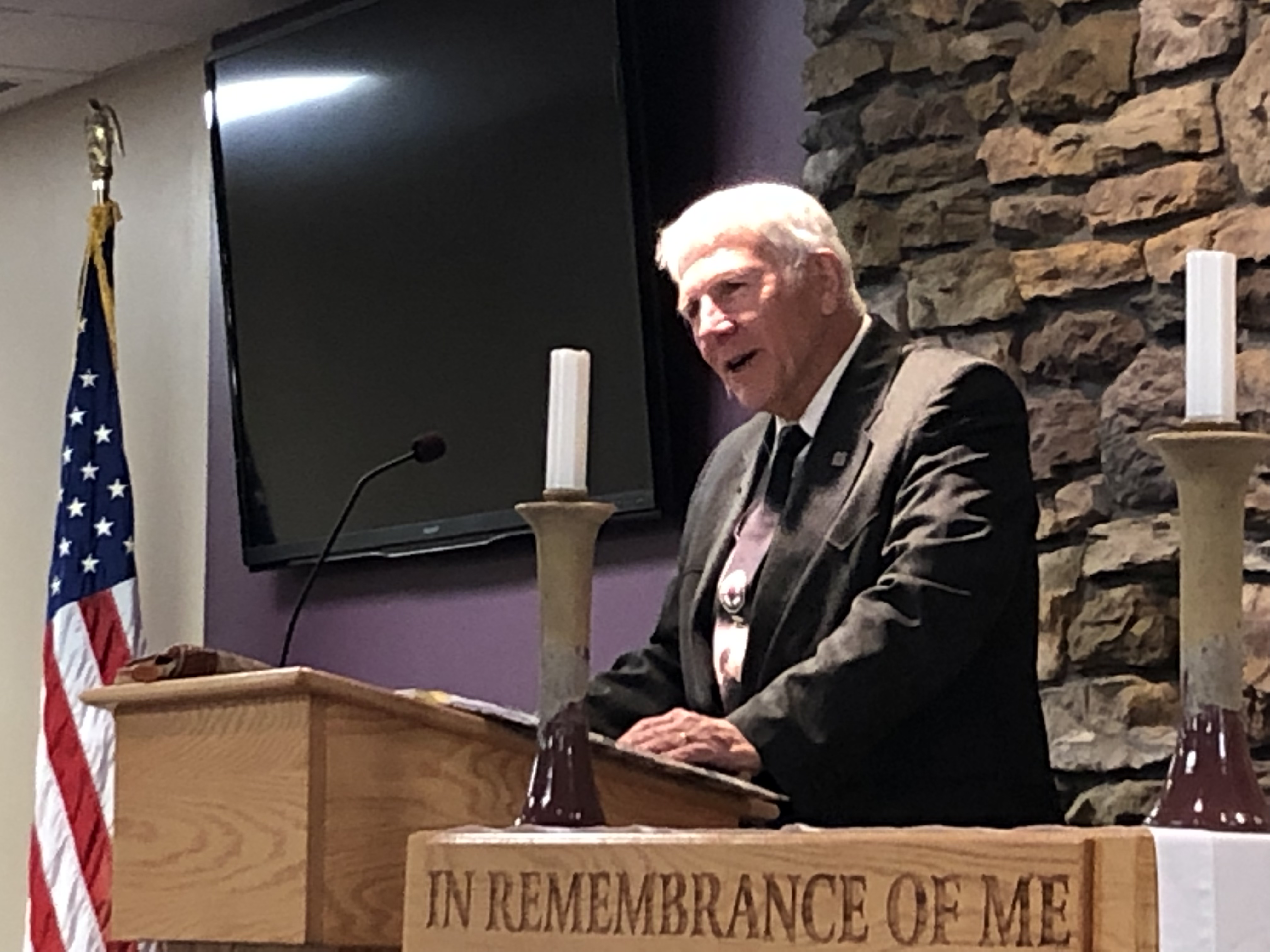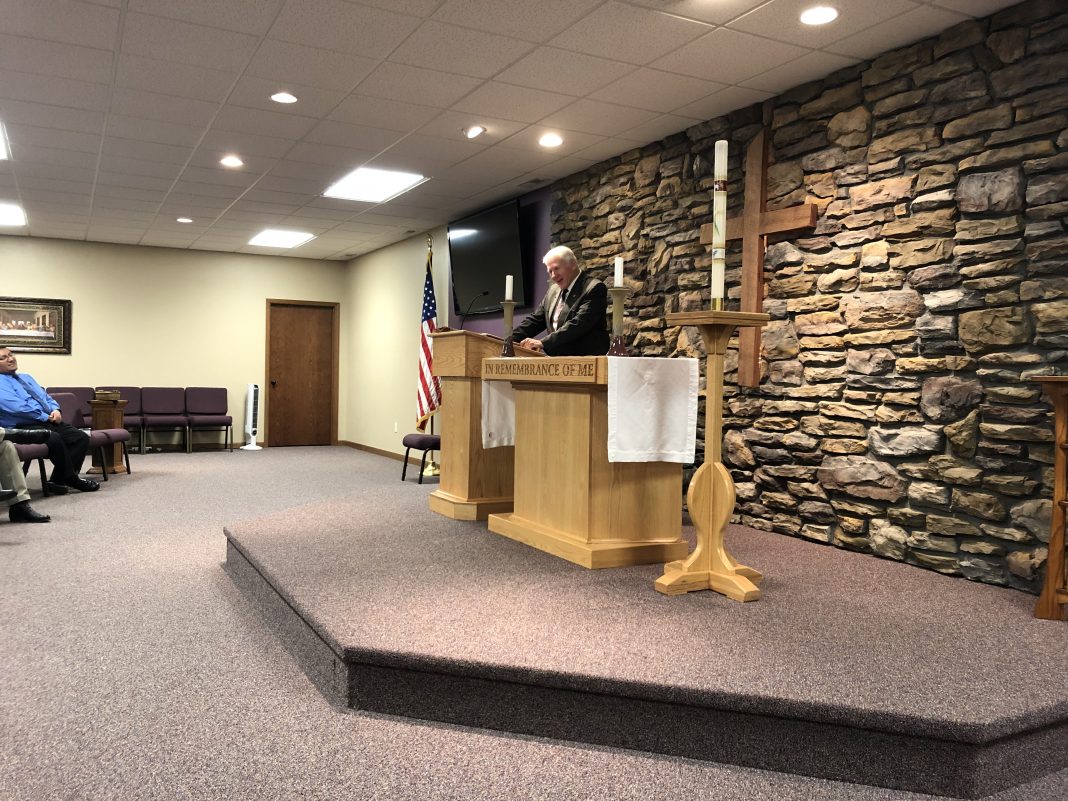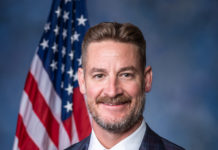About 50 people were treated to a presentation by Col. John Eidsmoe at Faith Lutheran Church in Holstein on Sunday evening. Eidsmoe, who owns farmland in Monona County, spoke about the faith of the Founding Fathers.
Eidsmoe wasted little time in sharing the conclusion he has come to regarding America and the role Christianity played in its founding.
“If by that term we mean a nation that is officially Christian…or a nation in which you have to be Christian to live here…or a nation in which you have to be Christian in order to run for office or vote or have other civic privileges — in that sense, no. The United States wasn’t founded as a Christian nation,” Eidsmoe said.
 “But if you mean it in the sense that it’s a nation that was founded largely by people who professed Christianity and is based upon values found in the Bible. Values that were brought here by Christians, in that sense, yes, this nation was founded as a Christian nation and remains a Christian nation to some extent today.”
“But if you mean it in the sense that it’s a nation that was founded largely by people who professed Christianity and is based upon values found in the Bible. Values that were brought here by Christians, in that sense, yes, this nation was founded as a Christian nation and remains a Christian nation to some extent today.”
He quoted Martin Luther, who referenced the two kingdoms God had created — church and state. He said the two kingdoms are not in conflict, but compliment each other.
“If the state is doing its job properly — the job of keeping the peace, preserving law and order — that makes it easier for the church to preach the Gospel and teach the Word of God,” Eidsmoe said. “If the church is teaching people to be good Christians and of good character, that makes it easier for the state to do its job.”
Natural law and Biblical law interacted and overlapped, according to Luther. There were laws involving righteousness and injustice that were of universal application. Other parts of the Old Testament law were laws of local application to Israel, but the application wasn’t beyond Israel.
“The Ten Commandments were not given to Moses, they were given to the whole world,” Eidsmoe said. “They were written in the heart of man from the time of Creation, as we read in Romans 2.”
The Ten Commandments, Eidsmoe said, were given to both government and man. The state uses the Ten Commandments to preserve law and order. The church uses them to convict of sin and lead people to salvation.
Eidsmoe talked extensively about the term “deist.” Many people who attempt to say America was not founded as a Christian nation will say plenty of the Founding Fathers were “deists.”
Without knowing the definition of deist beforehand, he said a parent’s persuasiveness to their child will take a hit right away.
Deists, he said, look at God like a clock maker. God created the universe and the natural laws and then went off into another galaxy. God, they say, is no longer actively involved in human affairs.
This means God did not inspire the writing of Scripture. Nor does God perform miracles. And, God did not take on human flesh to die for the sins of the world.
“Deist gods just don’t like to get involved like that,” Eidsmoe said.
The deists were an exceptionally small minority of the Founding Fathers and lacked influence, Eidsmoe said.
Typically they’ll point to Thomas Jefferson or Benjamin Franklin, usually while pulling quotes out of context. Eidsmoe acknowledged Thomas Paine was perhaps a deist.
“But Paine is hardly a major Founding Father,” he said. “He never held public office. He ended up leaving America shortly after the war for Independence and went to join the French Revolution. He got in trouble there, came back to America in his last days and six people attended his funeral.”
Paine, the author of Common Sense and later The Age of Reason, did one of two things when he wrote Common Sense. There’s no doubt The Age of Reason is clearly anti-Christian.
“Either Paine believed the Bible in 1776 when he wrote Common Sense but no longer believed in the Bible in 1800,” Eidsmoe said. “Or he didn’t believe the Bible in 1776 when he wrote Common Sense but he wrote as though he did because he had to make the case for Independence using the Bible knowing the American people would never buy it if he didn’t.”
Either way, Eidsmoe said, it’s clear Christianity was important to the American people at the time.
Examining the Founding documents, it’s clear Christianity was important. Article VII of the Constitution states: “Done in Convention by the Unanimous Consent of the States present the Seventeenth Day of September in the Year of our Lord one thousand seven hundred and Eighty seven and of the Independence of the United States of America the Twelfth.”
“The Founding Fathers had no reservations about making the birth of Jesus Christ the central event of human history,” Eidsmoe said.
The Treaty of Paris, which marked the end of the War of Independence, begins with the words in the name of the Most Holy and Undivided Trinity.
“That’s the document by which our independence is recognized by England,” Eidsmoe said. “Not just Biblical, not just Godly, but Trinitarian.”
George Washington is incorrectly called a deist by some, Eidsmoe said. Some of the reasoning for that is Washington as a man in the public eye he spoke for the whole nation and shouldn’t involve himself in doctrinal controversies.
Washington signed an oath saying he accepted the doctrine of the church he belonged to. Part of that included a Trinity with a divine human nature of Jesus Christ.
“If Washington was a deist he committed perjury when he signed that oath,” Eidsmoe said. “Many point out Washington didn’t take communion, but that’s not quite an accurate statement. Before the war he took communion regularly at the Church of England. After the war he took communion. During the war he took communion, but did so in other churches, not the Church of England. He would leave the church when communion was being served. Who was the head of the church of England? King George VIII. He was leading a war against King George, therefore he could hardly consider himself in good standing with the Church of England. Evidence that Washington was not a Christian, it simply isn’t there.”
Jefferson, Eidsmoe acknowledged, was an exception. He was an important Founding Father and primary author of the Declaration of Independence. But he had elements of religion as well.
Jefferson was a co-founder of a Calvinistic Christian Church. The pastor of the church was a staunch Calvinist and evangelical. Late in life, Jefferson wrote to the pastor, noting he had talked more with him than any other person about religion.
“That pastor never said anything suggesting that Jefferson was anything other than a Christian,” Eidsmoe said. “I would, but that pastor did not.”
In 1787 a friend asked Jefferson to serve as a godfather for his child, but Jefferson declined because he did not understand the doctrine of the Trinity.
“Notice, he doesn’t reject it, he can’t understand it,” Eidsmoe said.
Jefferson later expressed Unitarianism views, which were not Trinitarian, but he still believed God was involved in human history. Jefferson joined a church in the 1820s.
“Whether he changed his doctrine back to Trinitarian, I don’t know,” Eidsmoe said. “Jefferson certainly was not the deist many make him out to be, nor was he hostile toward Christianity.”
Franklin, Eidsmoe said, was gifted a book at age 14 that refuted deism. After reading it, Franklin came to the conclusion the arguments for deism were stronger than the arguments against it that the book presented.
“By the time he reached the ripe, old age of 21, he had seen the ways many of the deists lived,” Eidsmoe said. “Even if this doctrine was true, it wasn’t very useful, therefore it shouldn’t be emphasized.”
Franklin later gave a speech that is one of the most widely quoted speeches of the convention. He said the longer he lives, the more he is convinced that God governs the affairs of men.
“Believing that doesn’t make him Christian, but it’s a direct repudiation of deism,” Eidsmoe said. “If a sparrow cannot fall to the ground without His notice, is it probable an empire could rise without his aid?”
Of the 55 delegates to the convention, Eidsmoe said 28 were member of the Episcopal Church of England. Eight were Presbyterian. Seven were New England Puritans, two were Dutch Reformed, two were Lutherans, two were Methodist and two were Roman Catholics. Nobody is certain about one, but he was buried in the Episcopal Church yard.
Three out of 55 is what you would call unorthodox, according to Eidsmoe.
“That’s about six percent,” Eidsmoe said. “None of those would be really influential delegates to the convention.”
In a 1984 study, it was revealed that 34 percent of all the quotations from the writings of the Founding Fathers came from the Bible. It was the most widely quoted source in their writings.
Hamilton desired a strong central government in order to keep the depraved nature of man in check. Patrick Henry was concerned about the depravity of the men who would run the government.
“They start with the same premise about human nature, but come to opposite conclusions,” Eidsmoe said.
Both men professed their belief in Christ in their final moments prior to death.
John Jay and Samuel Adams were other men Eidsmoe spoke about.
Many of the Founding Fathers, he said, had a high view of God and God’s law.
“There was a belief that there is a higher law — the law of God to which human law must conform,” he said. “Secondly there was a low view of man and his nature. They believe that man is as the Bible describes him — sinful, self-centered, corruptible and therefore not to be trusted. That being the case, they needed to formulate a system of government that dealt with those realities.”
It used to be common for preachers to deliver election day sermons.
“This is something they considered to be their responsibility,” Eidsmoe said. “It was their responsibility to God to make sure that the government and those in charge of the government knew what the Biblical views of government was. I don’t think they would say they have the power to force government to do anything, but they certainly had the power to tell the government what God’s Word has to say.”
Eventually the Founding Fathers decided the government would need five points.
First, it needed to be limited and have delegated powers. Second, there needed to be a separation of powers. Third, checks and balances were necessary. Fourth, individual rights needed to be reserved — a majority could not always rule. And finally, there was a responsibility through religion. They did not want a state church, which was the reason they left England.
“But they didn’t come here to get away from prayer at football games,” Eidsmoe said. “They didn’t come here to get away from the Ten Commandment displays. They understood that religion plays a role in society.”
The challenge for America then is similar to the challenge for America now. As Franklin said, America is set up as a Republic, if we can keep it.
















